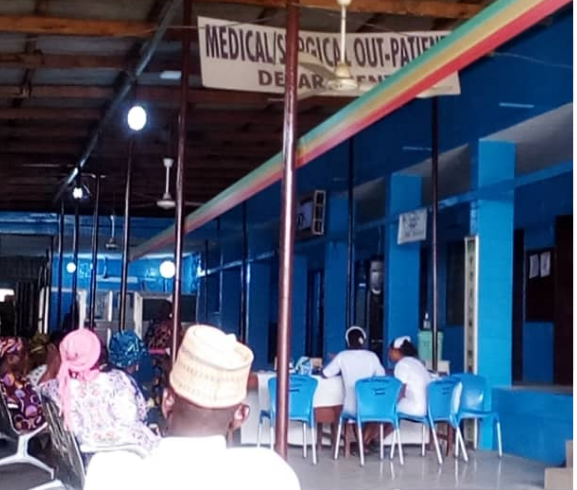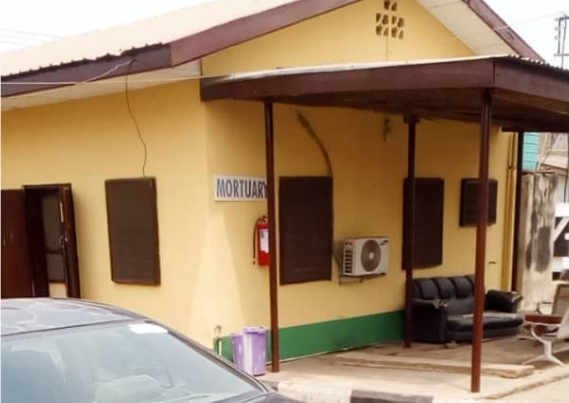When a patient dies, his or her death is usually blamed on sickness, but don’t be mistaken: Nigerian health officials would have enormously contributed to it. Deaths of many patients would have been fast-tracked by the many drawbacks of a comatose public health system. However, to ascertain the time an average patient spends before seeing a doctor, and to experience what patients go through in government hospitals, Information Nigeria’s Editor, Gbenga Odunsi — who disguised and registered as a patient at the Ogun State General hospital on Sokenu Road, Ijaye in Abeokuta — brings this report.
At about 1:30 pm on a sunny afternoon, the patient-journalist walks up to the registration desk to make inquiries on how to get hospital card. Here, every patient is required to pay N300 to obtain a card before seeing a doctor.
“You cannot get a card now”, says a woman at the small cubicle where patients register to obtain hospital card.
“You have to wait till 3:30 pm when the doctor for the next shift arrives.”
Alarmed, I ask what would happen if I have brought an emergency case.
“You still have to wait till 3:30 pm”, she said. But you can go to the emergency ward and tell them. They may attend to you if they see your condition requires emergency”, she added.
Well, since there was no possibility of seeing a doctor, I left the hospital.
The next day, I got to the hospital at about 8am.
I met a young lady at the point of payment section of the General Outpatient Department (GOPD). She was the only one attending to patients — both new and returning ones.
At the Records department, a middle-aged man and lady tended to every patient. The job of the lady requires collecting receipts after payment, while the man inputs the demographic details of patients in a higher education book (not even a computer). This process lasted several hours and patients, including those with emergency cases, had to wait it out.
After my details were collected, I joined the queue of patients waiting to see the doctor. At about 9:45am, a nurse called me to check my blood pressure. At the hospital, it is a norm for nurses to examine patients before assigning them to a doctor
And again, this process took longer time; even though three nurses were responsible for this procedure. They were seen gisting, chatting, and laughing while attending to sick patients.
Many Nigerians prefer to practice self-medication than visit the hospital. The fear of spending long hours before seeing a doctor drives sick people to self medicate.
While waiting to see a doctor, Information Nigeria observed that consultation session with doctors did not last up to 10 minutes. Despite complaints of a severe and constant headache, accompanied by body pains, the consultant doctor only asked two questions and scribbled down medical jargons on my card. This didn’t last up to 6 minutes either.
How doctor’s negligence led to death of a sick child
Information Nigeria recalls a Nigerian woman, Oyin Gucci, who lost her child in 2019. The bereaved mother recounted how she lost her nine-month-old son due to carelessness of a doctor at the Ikorodu General Hospital in Lagos State.
According to Gucci, her son suffered from an attack at 3 a.m. on July 19 and she rushed him to the General Hospital, Ikorodu. A nurse on duty met them, but the doctor who was scheduled to be on duty was absent and his phone was switched off. Consequently, the nurse said there was little she could do for the sick child.
Gucci narrated how two hours later; the doctor strolled in leisurely, unperturbed. He acted as if there was no emergency and did not offer any direct treatment to her son. Instead, he wrote some prescriptions for her to buy and left for the mosque to pray.
Thirty minutes later, he returned and attended to other patients. Gucci felt these other cases were not as serious as her son’s, whom she could see was struggling to breathe. In the end, her son died more than 6 hours after arriving at the hospital.
The situation is not different at Ogun state hospital
Crossing his arms with his left hand out, Bimbo detailed how his brother died at the state hospital due to negligence of the doctor on duty. Wearing a sombre look, the agony in her eyes is evident. Two months after the sad experience, the 32-year-old lady has not been able to get over her loss. She gnashes her teeth intermittently, stressing that her brother’s death has caused damage in the family.
Bimbo says her brother, who was ill, was rushed to the state hospital on 2nd December, 2019. On arriving at the hospital, he was wheeled to the emergency unit but nurses refused to attend to him until a hospital card was obtained, which took up to an hour, due to a large number of patients on waiting to obtain a card. Several minutes after getting the card, the patient was still not attended to.

“The nurses on- call were like voltrons; they work at their own convenience and you cannot confront them.
“But I managed to challenge the doctor when he walked majestically into the ward. With no sign of remorse, the doctor said ‘he won’t kill himself over an emergency case’.
My brother was finally examined; his blood sample collected, and the doctor asked me to take it to the lab for a test.
“The doctor finally examined my brother, took blood samples and asked me to take it to the lab for test. But unfortunately, when I got to the lab, I was told its past 4pm and I would have to come back the following day for result.
“With this development, my brother was left without treatment throughout that day until the lab test results were ready the following day. Two days after, he was hurriedly moved out of the emergency unit, due to lack of bed space. On the third day, his condition worsened, his breathing changed.
“Again, we were told there was no doctor on duty and we would have to wait till the next doctor on shift resumes. I almost ran mad when my brother breathe his last breath.

Why a state hospital is understaffed is what I am yet to understand. Many tragic incidents that happened in this hospital could have been avoided if there were enough doctors,” Bimbo added, in an embittered voice.
Like Bimbo, the visit to Ogun State hospital was similarly a nasty experience for Mr Toba Ogundele, a 41-year-old secondary school teacher.
Ogundele had gone to the hospital to complain of chest pain. According to his narration, he got to the hospital around 10am but was unable to see the doctor until 2:10pm, after a long wait at the General Outpatient Department
“On seeing the doctor, I explained the symptoms of my illness and he suggested I have a blood test. But on getting to the laboratory department, I was told to come back the following day as they could no longer take blood sample for the day. I had to go back home, still in pains.
“The next day, I ensured I arrived the hospital by 9am before it was already crowded. The lab attendant asked me to pay N1500, which I did. The blood sample was taken and I was asked to return for the result by 1pm.
“Due to the excruciating pain, I couldn’t go to work or even move around; so, I hung around the premises. By 1pm, I was back at the lab for my result. Lo and behold, it wasn’t ready. It took another 55 minutes for the result to be ready.”
“I collected it and hurried back to the General Outpatient Department, hoping to see the doctor and get drugs, but those I met on the queue were already tired and lamenting the queue wasn’t moving at all.
“Out of frustration and annoyance, I left the hospital unattended to, after all the sufferings.”
Endless frustration of patients
Information Nigeria met with a man where he sat on a covet beside the maintenance department of the facility, fanning himself on a Thursday afternoon. Recounting his experience on how doctors and nurses treated patients when his mum was placed on admission at the state hospital, the 35-year-old man, who pleaded anonymity said:
“The nurses have bad manners; they are always rude to patients. Some go as far as screaming at sick patients. While I was at the ward with my mother, on several occasions, I kept reminding nurses that the drip of a patient was finished and needs to be changed. You can imagine that kind of negligence,” he says, while his face contours into a frown.
“Most of the nurses are only good at gossiping with themselves on their seat. When their attention is needed, they find it difficult to leave their seat to attend to patients in the ward. They hardly treated emergency cases with speed of urgency.
“If they were truly trained as nurse, they would understand that 3 seconds is a lot of time to waste. If some patients had 3 seconds, they could have been alive today. It is a pity but with my experience here, I can boldly state that a lot of deaths that happen in Nigerian hospitals occurred because the patients lived in Nigeria. You would never find unruly health workers in foreign countries, and they take patients health more seriously.
“Would you blame politicians who travel to foreign countries to treat cough and headache, when health practitioners in Nigeria, who took an oath to save lives are doing the exact opposite?
“Just two days in the ward, I saw more patients die like it was the latest trend. I would never forget a young girl who was frequently in pain while his parents watched helplessly, but the nurses did nothing about it. Regularly, I would go to meet the nurses to please come attend to her.
“I got to the ward this morning to hear she had died, just imagine such, in a country that claims to be giant of Africa.”

It is widely believed that medical bills at state hospitals are relatively cheap and affordable for the average Nigerian, but with the attitude of Ogun health workers, sick patients prefer visiting private hospitals where they will have to pay much but get timely attention. While patients have recounted their experiences of longer ‘waiting in’ emergency ward or at the General Outpatient Department, leading to frustration and anxiety, some have put the blame on the underfunded system and understaffing.
Temidayo, 28, a webmaster based in Abeokuta said he once left the state hospital in anger after several efforts to see a doctor but was discouraged by the number of patients on queue waiting to be attended to.
“I was not feeling too well sometimes last month, I made a decision to visit the state hospital for a checkup, since it is just a mile away from my house. I arrived there at about 11am but was greeted by hundreds of patients waiting for a doctor to attend to them.
“If I had waited on that particular day, I am sure I won’t be able to see the doctor until evening. So, I went back home and returned the following day, this time, around 8am.
“Again, I was welcomed by tens of other patients already seated at the general out-patient department, waiting to see a doctor. I had thought I would be among the first ten patients.
“I joined others, but when it didn’t get to my turn around 11am, I left the hospital and checked into a private hospital where I was given quick attention.”
Mortuary with limited body trays
With the negligence, carelessness and recklessness of doctors and nurses at Ogun State Hospital, it is not surprising that the mortuary section of the hospital is filled to the brim.
On February 14th, a day commonly known as Valentine’s Day, I stormed the mortuary, posing as ‘bereaved’ hunting for a morgue for a freshly dead uncle. I spent time with dead bodies; moving from one corpse to another, ranging from accident fatalities, murder victims, among others.
The morgue-attendant, an elderly man in his mid-50s, shows no pity at the bereaved visitor trying to make inquiries.
“Bring your corpse first, I will explain everything to you,” he says. I made him understand family members sent me and I need to get the necessary information to make an informed decision on whether we will bring our corpse or find somewhere else.
Knowing I may change my mind if he doesn’t spell out the costs and other necessary information, the tall, slim-figure mortuary attendant opens up.

“I need to see the place where the deceased will be kept, I interrupted.
“You want to enter? Come in,’ he says, without hesitation.
The morgue of the state hospital is neat and well cleaned. All the corpses were neatly placed on body trays, and no stench emanated from the air-conditioned room. Inside the mortuary, a brightly lit room is quiet; no sound whatsoever. The smell of cleaning agents filled the air. Out of respect for the dead, I decided not to take pictures of corpses.
Although the room is neat, stainless body trays were in limited supply. Asked where the new corpse I intend bringing will be laid, the morgue attendant insists I “bring it first, then we will find a space for it”.
“When did he die?
“Is he fat?
“Bring him first…”
These were the words the morgue-attendant uttered, to my dismay.
Depositing a corpse at the state hospital morgue costs N25,000 for the first one week, after which N500 will be paid daily at the expiration of the first seven days. These are official rates pasted on the door entrance of the morgue.
It is time to bargain price, but the attendant insists the prices are official. Even though I knew he could do some reductions to make gain for his personal pocket, I blatantly told him the prices are on the high side and I may just have to look for another morgue.
“This price is cheap when compared to other mortuaries in town, you can go there to confirm,” he says, insisting he would not soil his hands in corruption.
This attendant is not your average Nigerian. He belongs to a slim clique of men who, despite temptations, would remain resolute while shunning corruption.
In his 2020 budget presentation to the State House of Assembly, on Tuesday, 3rd December 2019, Governor Dapo Abiodun says a total sum of N44.719 billion has been earmarked for the Health sub-sector.
Abiodun said his administration will enhance health care delivery in the State through rehabilitating, equipping and providing adequate staffing for the general hospitals and the Olabisi Onabanjo University Teaching Hospital (OOUTH) so as to continue to serve as effective referral centres for the lower tier healthcare delivery centres.
The state hospital is vast becoming a home of pains, agony, and deaths, and Ogun state residents can only but hope that the several challenges facing the state hospital, including understaffing, would be resolved soon to forestall further loss of lives of patients.





This situation happens everywhere including d state teaching hospital at Akure,ondostate.Am appealing to the state Government to do something about it.After all the Government pay them.